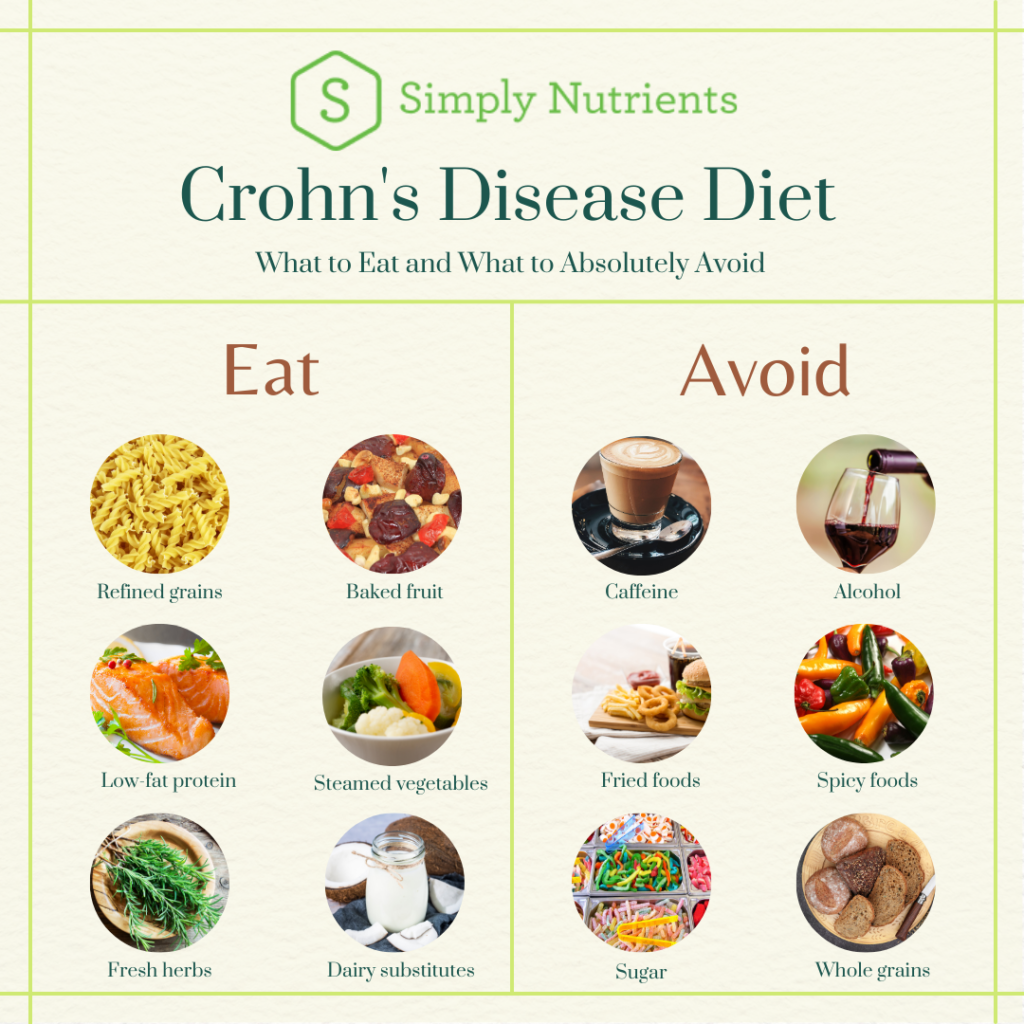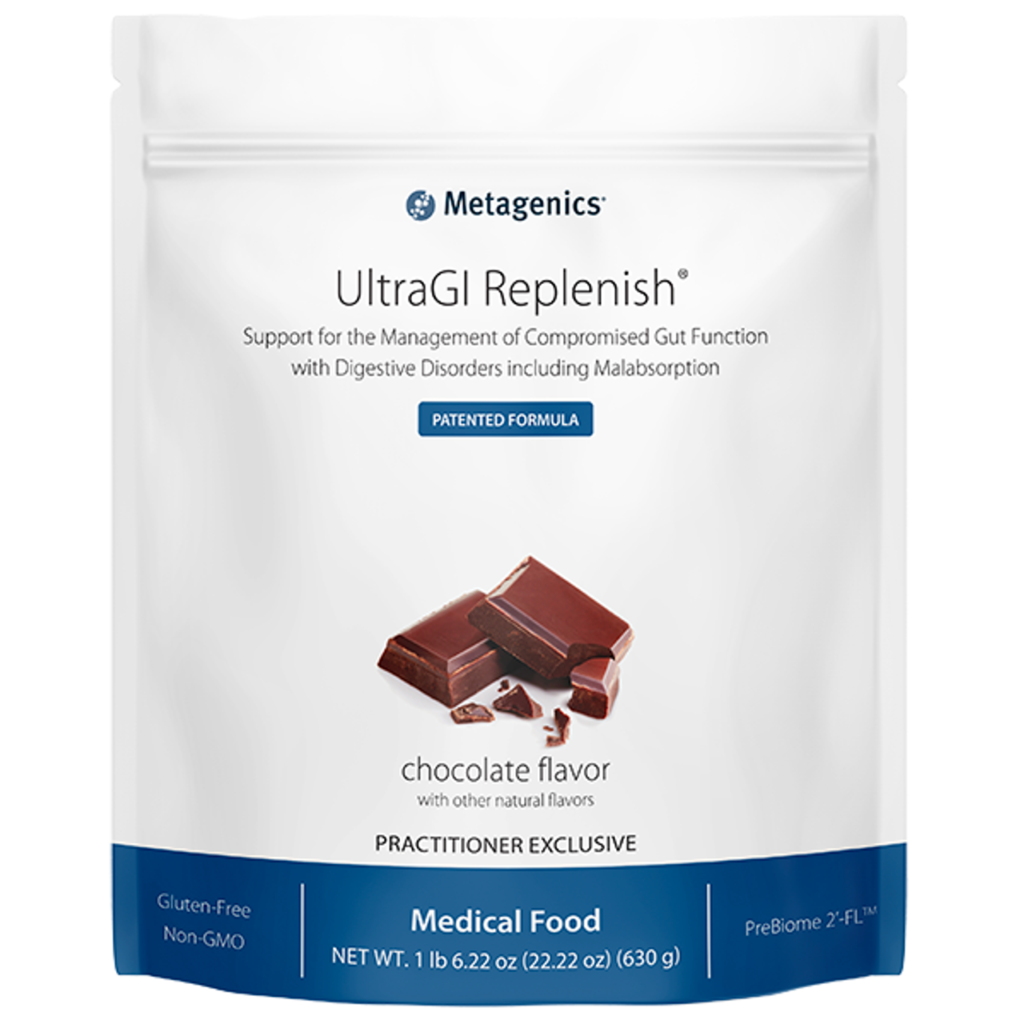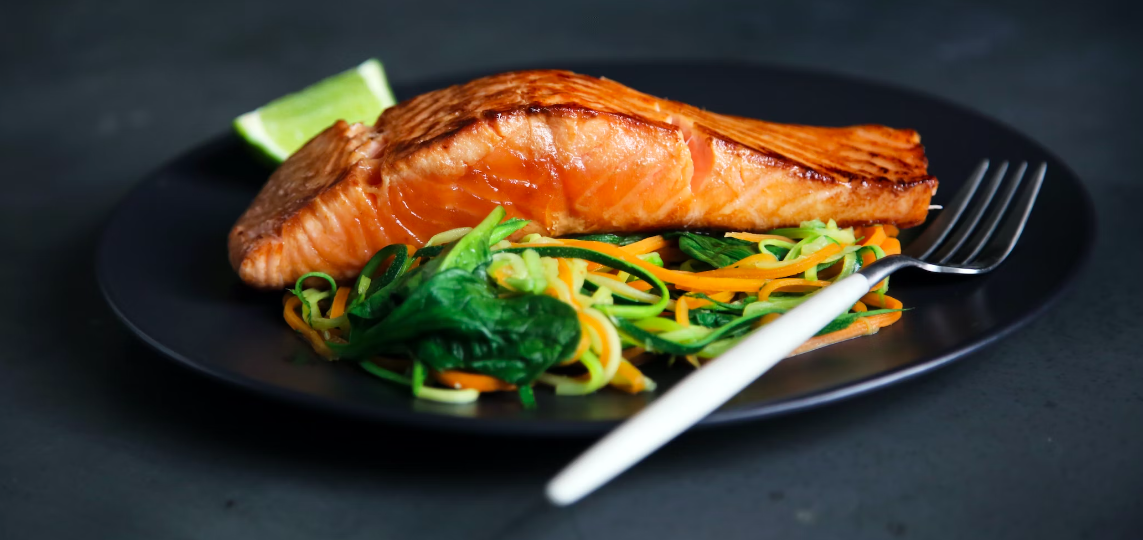Last updated on May 30th, 2023 at 12:12 pm
The Crohn’s disease diet is an essential part of managing Crohn’s disease — a chronic inflammatory bowel disorder. The illness affects millions of people worldwide and can cause a variety of symptoms, including abdominal pain, diarrhea, fatigue, and malnutrition.
While there’s no cure for Crohn’s disease, following a healthy eating plan may reduce inflammation, prevent flare-ups, and improve your quality of life. The correct diet could even help medications work more effectively and heal your digestive tract.
Let’s delve into the details of the Crohn’s disease diet, including what to eat and what to avoid to manage your discomfort and promote overall health.
Whether you’re newly diagnosed or you’ve lived with the condition for years, this guide provides the information you need to take control of your wellness.
What Is the Crohn’s Disease Diet?

The Crohn’s disease diet is a way of eating that helps minimize and reduce the severity of Crohn’s disease symptoms during a flare-up. The eating plan is flexible and includes a variety of fare from each food group.
Did you know? There’s an excellent way to manage the symptoms of Crohn’s disease without delving into eating plans. While it’s important to maintain a healthy diet, consider supplementing with our compromised gut function products.
As the illness often causes diarrhea, patients can have difficulty absorbing protein, fat, carbohydrates, water, vitamins, and minerals. Frequent cramping can also lead to a reduced appetite, ultimately lowering the intake of essential nutrients.
The Crohn’s disease diet emphasizes easy-to-digest dishes that increase the body’s hydration levels to counteract the effects of these symptoms. It also helps individuals with the condition to eat balanced meals that reduce the inflammation caused by certain foods.
Important note: There’s no standardized diet for patients with Crohn’s disease. Work with your healthcare provider or a registered dietician to ensure your eating plan meets your individual nutritional requirements.
Foods You Should Eat
Most experts agree it’s important for people with inflammatory bowel disease to eat a healthy, varied diet [1].
However, during a flare-up, doctors often recommend limiting foods that contain indigestible materials [2]. This puts as few demands on the digestive tract as possible, allowing it to rest and recover.
Here are the general guidelines for the nutritious options you can include to ease the symptoms of Crohn’s disease and improve your gut health.
Grains
Grains are an important component of a healthy, balanced diet and provide essential nutrients like fiber, B vitamins, and minerals. But if you have an irritable bowel disease, you should limit the amount of whole grains you eat.
According to the Crohn’s and Colitis Foundation of America (CCFA), the insoluble fiber in these foods may be aggravating during a flare. It’s best to choose refined grains that are easier to digest, such as:
- White rice and pasta
- Oatmeal
- Polenta
- Cornmeal
- Gluten-free bread
- Saltine crackers
Fruits and Vegetables

Fruits and vegetables are a vital part of balanced nutrition, but they can be difficult to digest due to their insoluble fiber content and may exacerbate abdominal pain and bloating.
Instead of avoiding this food group entirely, reap its benefits by preparing your meals differently. Steaming or baking fruits can make them easier for your body to process, while removing the skin and seeds from certain vegetables may also help reduce the risk of triggering symptoms.
Choose ripened, low-fiber fruits like:
- Apricots
- Bananas
- Cantaloupe
- Honeydew melon
- Nectarines
- Papaya
- Peaches
- Plums
Include well-cooked vegetables in your diet, such as:
- Asparagus
- Beets
- Carrots
- Eggplant
- Green beans
- Mushrooms
- Potatoes
- Pumpkin
- Spinach
- Squash
Protein
Proteins are complex molecules that play many essential roles in your body. They’re involved in building and repairing tissues, supporting immune function, and providing energy.
This food group is particularly important for individuals with Crohn’s disease, as it helps support the healing of inflamed intestinal tissue and reduces their risk of malnutrition [3].
Unfortunately, not all protein sources are equal, and some may be more difficult to digest than others due to their high fat content. Additionally, a diet that includes large amounts of lipids may exacerbate inflammation in the gut, further aggravating symptoms [4].
Here are some lean protein sources recommended for diets that combat Crohn’s disease:
- Eggs
- Beans
- Fish
- Chicken
- Chickpeas
- Lentils
- Turkey
- Tempeh
- Tofu
Dairy
Dairy is a common source of both protein and calcium, making it essential for a balanced diet. However, for individuals with Crohn’s disease, eating these products may present a challenge due to the damage the condition causes in the digestive tract.
Many people with inflammatory bowel disease are also lactose intolerant, making it difficult for their bodies to process the nutrients in dairy products.
Due to these factors, try eating the dairy alternatives described below:
| Dairy Alternative | Taste/Texture | Substitute For |
| Soy milk | Thin and slightly creamy | Milk |
| Almond milk | Thin and slightly nutty | Milk |
| Coconut milk | Thick and creamy | Cream, yogurt |
| Nutritional yeast | Cheesy and nutty | Cheese |
| Avocado | Creamy and rich | Cheese, sour cream |
| Coconut yogurt | Creamy and tangy | Yogurt, sour cream |
Remember: Check the labels of the substitutes you choose to ensure you consume products fortified with calcium and vitamin D.
Spices
Spices are an often overlooked, but important, aspect of the Crohn’s disease diet. While some spicy foods may trigger symptoms, others could have anti-inflammatory effects that may help soothe your digestive tract.
Scientists have linked turmeric to minimizing flare-ups, thanks to its active ingredient called curcumin [5]. It reportedly also has antioxidant properties that could improve overall gut health.
Ginger could also be beneficial for individuals with Crohn’s disease. The root spice might help relieve nausea and vomiting, which are common symptoms of the illness [6].
Other herbs and spices to include in your diet are:
- Chives
- Cumin
- Cinnamon
- Rosemary
Foods You Should Absolutely Avoid
You may find that certain meals induce your symptoms or lead to a flare up of your condition. While specific trigger foods vary amongst patients, there are some dishes that commonly irritate the gut and contribute to inflammation.
Foods that typically worsen symptoms include:
- Whole nuts
- Dairy
- Alcohol
- Fried foods
- Popcorn
- Caffeine
- Spicy foods
- Whole grains
- Raw vegetables
- Sugary food and drinks
- Processed meats
- Dried fruits
- Figs, prunes, and berries
You may find it valuable to keep a food diary of what you eat each day to help identify the meals that trigger your symptoms or exacerbate inflammation. Look for patterns and adjust your diet accordingly.
Supplements
Supplements can be an important part of managing Crohn’s disease. While they shouldn’t replace a healthy diet, they can help support the body and provide it with essential nutrients.
We often recommend UltraGI Replenish or UltraGI Replenish to our customers with inflammatory bowel disease. This supplement is a medical food containing a blend of nutrients that can aid digestive function and promote overall gut health.

<alt tag: Avoid high-fiber foods, animal fats, and fried traditional foods>
One of its key ingredients is prebiotic fiber. As the body doesn’t digest this type of roughage, it feeds the beneficial bacteria in the stomach [7]. This mechanism promotes a healthy microbiome, lowering inflammation.
Another component in UltraGI Replenish is L-glutamine. This amino acid is crucial for maintaining the integrity of the gut lining, which is likely compromised in people with Crohn’s disease.
L-glutamine may also help support the regeneration of the gastric lining so its cells can work effectively [8].
Annelise confirms that UltraGI Replenish supports her digestive function and helps ease her Crohn’s disease symptoms:

<alt tag: Eat foods like lean meats to ease symptoms>
Harness the Power of Nutrition
The correct eating plan can be a powerful tool to manage Crohn’s disease. While there’s no one-size-fits all approach to nutrition, making certain dietary adjustments could help ease your symptoms, reduce inflammation, and promote whole-body well-being.
By following the Crohn’s disease diet and paying attention to how food affects your body, you can take control of your condition and improve your life. Work closely with your healthcare provider to create a personalized plan that meets your goals.
Simply Nutrients believes food is more than just fuel for your body. By harnessing the power of nutrition, you can take important steps towards healing from within and achieving optimal health.
Contact us to learn more about creating a comprehensive plan, including both whole foods and supplements, to manage your Crohn’s disease.
Resources
[1] https://www.ncbi.nlm.nih.gov/pmc/articles/PMC7852575/
[2] https://med.virginia.edu/ginutrition/wp-content/uploads/sites/199/2014/06/Parrish-July-15.pdf
[3] https://www.ncbi.nlm.nih.gov/pmc/articles/PMC5372973/
[4] https://www.ncbi.nlm.nih.gov/pmc/articles/PMC6893649/#:~:text=Data%20indicated%20that%20excessive%20fat,tissue%20dysfunction%20and%20metabolic%20inflammation.
[5] http://www.eurekaselect.com/article/54792
[6] https://www.ncbi.nlm.nih.gov/pmc/articles/PMC4818021/#:~:text=Ginger%20is%20an%20ancient%20herb,and%20vomiting%20and%20is%20safe.
[7] https://www.ncbi.nlm.nih.gov/pmc/articles/PMC3705355/
[8] https://www.ncbi.nlm.nih.gov/pmc/articles/PMC4369670/#:~:text=Its%20consumption%20in%20small%20bowel,gut%20barrier%20functions%20%5B3%5D.
NOTHING IN THIS WEBSITE IS INTENDED AS, OR SHOULD BE CONSTRUED AS, MEDICAL ADVICE. ANY HEALTHCARE AND/OR NUTRITIONAL MATERIAL CONTAINED IN THIS WEBSITE IS FOR CONSUMER INFORMATIONAL AND EDUCATIONAL PURPOSES ONLY. SUCH MATERIAL IS NOT INTENDED AS MEDICAL ADVICE FOR CONDITIONS OR TREATMENT, NOR IS IT INTENDED AS A SUBSTITUTE FOR A MEDICAL EXAMINATION BY A HEALTHCARE PROFESSIONAL. CONSUMERS SHOULD CONSULT THEIR OWN HEALTH CARE PROFESSIONALS FOR INDIVIDUAL MEDICAL RECOMMENDATIONS.
- Magnesium Threonate: An Honest Buying Guide for Health Enthusiasts - March 21, 2024
- Magnesium Citrate Vs Glycinate: 5 Key Differences And Benefits - March 14, 2024
- How to Pick the Best Magnesium Glycinate Supplement for You - March 7, 2024




